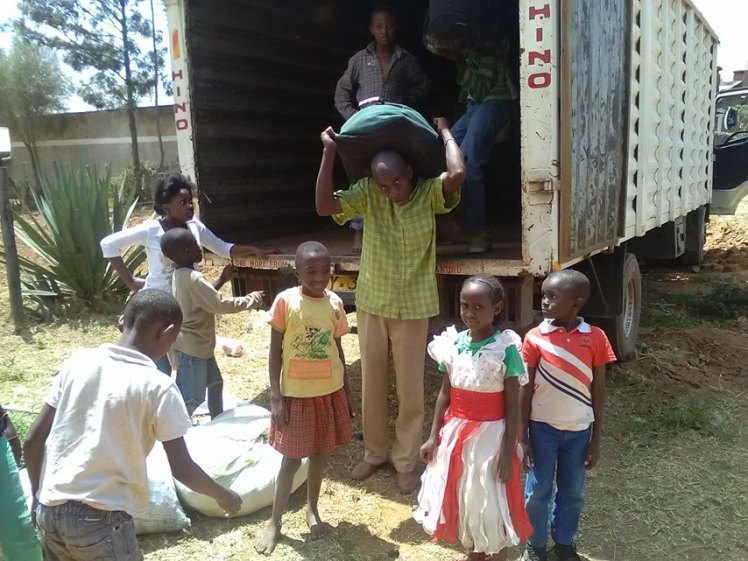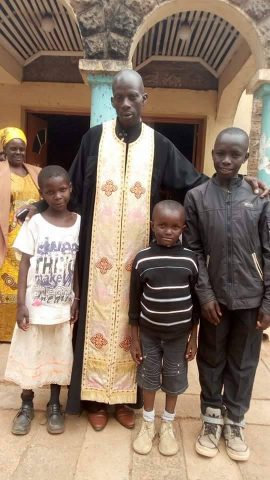
1. Can you briefly tell us what led you to became an Orthodox Priest?
I was born to a very poor family. My father was not able to take me to high school. A friend of mine, who was a member of Orthodox Church, came and told me about the Orthodox Church. I was happy and I decided to join the Orthodox Church in the year 1995. I was baptized and I became a full member of the Orthodox Church the same year.
2. Could you give us a brief history of the St Tabitha House?
When I joined Orthodox Church, a well wisher paid part of my school. He took me to Saint Makarios Seminary, to study theology for three years. During my studies in the seminary, I saw the poor children suffering, while we were eating a lot of food in the seminary. I felt the pain the poor kids were going through. I went to my Archbishop Seraphim and requested him to support me, so that I can start feeding program, and then after feeding the children I can also teach them about Orthodox Faith. His Eminence accepted, and he started giving me money for juice and bread every day. After graduating from the seminary the year 2002, I was not able to continue feeding the children due to funds. After post election violence the year 2007, many parents from kibera slums died and children were left orphans. I was sent to be the parish priest at Saint George parish, located in kibera slums, which is the biggest slum in all Africa. Lord have Mercy; the situation here was more terrible than all the places in Nairobi. I found myself crying because of the situation the poor children were in. I then decided to start feeding the children at my parish. Apart from my parish, I was also the director at Saint George School, where I was serving 300 children until now. I decided to start another mission by the name Saint Tabitha, so that I can care for the orphans and the widows, especially from kibera slums where I was serving as the parish priest. I took those most needy kids to my own house; I told my wife to take them as our own children and she did. That’s how Saint Tabitha House started.
3. According to your website, you are currently caring for 26 orphans. Could you tell us what an average day at the St Tabitha House consists of?
Yes, its true, I am caring for 26 Orphans, and St Tabitha runs everyday.
Due to security in Kibera Slums, we decided to relocate to Kisumu Diocese where we are now. We have homed 26 children. We provide all basic needs to the children. We spend near one dollar for every child, for food daily which is $26 daily for food. For those children in primary school, we spend $150 yearly for school fees. For those in high school, we spend $400 yearly for school fees. Twenty children are in primary and six children are in high school.
4. According to statistics, Kenya has the most Orthodox Faithful in all of Africa. Could you tell us why you think Orthodoxy has resonated so well with the people of Kenya?
When the missionaries first came to Africa, they went to Uganda. Then after they came to Kenya. Later, President Makarios of Cyprus visited Kenya, and he started the seminary for all Africa.That made the Orthodox Church grow very first in Kenya. Many people joined the Orthodox Church. Saint Makarios Seminary, being the only seminary in Africa, we are more access to Orthodox theology than any other country in all Africa.
Orthodox in Kenya has many faithful due to good missionary work done by priests, who have even reached the remote areas.
5. Could go into a little detail on what missionary work in Kenya is like?
Missionary work in Kenya is so difficult, because of lack of facilitation in forms of: funds, facilities, and other resources. Missionaries are very willing to work in Kenya, but also they face challenges like language barriers.
6. Kenya is currently suffering from a severe drought. Can you tell us what the situation is like for our Kenyan Faithful?
Its true, drought has invaded Africa, and also some parts of Kenya are affected, like North Eastern and central region of Kenya. Some of our Christians are really suffering, because they don’t have water and food.
7. Many people in the USA don’t know that one of Kenya’s official languages is English. Could you briefly explain some of the common culture Kenya shares with the rest of the English speaking world?
The cultures that Kenya share with others are like: Traditional marriage and values.
8. Back in 2015, Islamic terrorists killed 147 people, at a Christian university. Is persecution of Christians, in Kenya, a common occurrence?
Islam has been targeting Kenya most of the time. The government of Kenya has opened refugee camps, and that has made our country to be at risk all the time. The government is always on a lookout to make sure everything is secure. Right now, all is well and we hope peace will be found.
9. In your opinion, what are the top 3 most serious problems Orthodoxy faces, in Kenya?
The three most serious problems Orthodoxy face in Kenya are:
– poverty (financial crises affecting Greece and Cyprus.)
– lack of Education (educational programs are not well planned due to finance.)
– lack of Resources for missions (most Church members are not employed)
10. In your opinion, what are the top 3 most positive things going for Orthodoxy, in Kenya?
Positive things are:
– we have new Dioceses
-Donors have helped the church to grow
-more Churches are coming
11. What are the best ways that Orthodox Christians, in the USA, can aid our Orthodox brothers and sisters in Kenya?
9. In your opinion, what are the top 3 most serious problems Orthodoxy faces, in Kenya?
The three most serious problems Orthodoxy face in Kenya are:
– poverty (financial crises affecting Greece and Cyprus.)
– lack of Education (educational programs are not well planned due to finance.)
– lack of Resources for missions (most Church members are not employed)
10. In your opinion, what are the top 3 most positive things going for Orthodoxy, in Kenya?
Positive things are:
– we have new Dioceses
-Donors have helped the church to grow
-more Churches are coming
11. What are the best ways that Orthodox Christians, in the USA, can aid our Orthodox brothers and sisters in Kenya?
The best ways of aiding Kenyans at St Tabitha is helping in funding it, in order to achieve its mission and to help the community.
Thank you so much for your time, Father.
Before we conclude this interview, is there anything you would like to add?
Before we conclude this interview, is there anything you would like to add?
Due to the crises in Cyprus and Greece, we have been fully affected here in Kenya. That’s why, at Saint Tabitha House, we need to set up income generating projects like: poultry farming, dairy farming, computer services e.g. internet services, computer training, beat work, etc, and a good primary school for the children (who have parents and can afford to pay fees), so that we can get funds to maintain the orphanage.
Lord have mercy. May the Almighty God be with you all. God Bless.
– Father Agapios
– Father Agapios


Δεν υπάρχουν σχόλια:
Δημοσίευση σχολίου